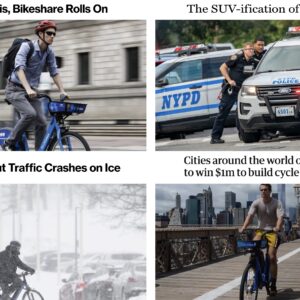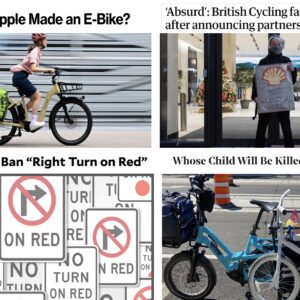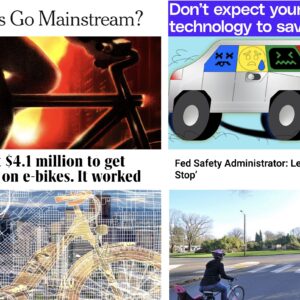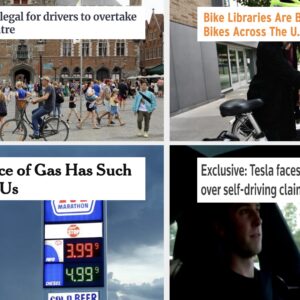“People who drive less than average tend to subsidize their neighbors who drive more than average.”
— Todd Litman, Victoria Transport Policy Institute
Welcome to Monday. We’ve got a lot of great stories to bring you this week. But before we do, below are a few of the noteworthy items and other fun stuff you might have missed last week…
— In this excerpt from a recent stand-up comedy routine, the great Louis CK nails the “different set of values” people exhibit when they are behind the wheel of an automobile (and they’re not pretty).
— An editorial from USA Today (of all places) shares a perspective on the debate over how to generate revenue for infrastructure. They say the VMT tax and other schemes are too complicated and, for now, “The simplest, fairest and least invasive way to respond to lower gas tax revenue is with higher gas taxes.”
— The Washington Post takes note of D.C.’s flourishing efforts to encourage more women to ride bikes.
— With all the Bike Month hoopla of May, and unseasonably warm and dry weather, a lot of people are trying out bicycling for the first time these days. Check out this excellent comic from Bikeyface that captures the driver-to-rider transition perfectly.
— An interesting article in Forbes crunches the numbers on auto and e-bike sales and asks the question: “Are E-Bicycle Sales Reducing Car Sales In Europe?”
— How bad is the bike theft problem in San Francisco? Well, news cameras were rolling during a media event downtown on Bike to Work Day when a thief made off with someone’s bike in broad daylight.
— It’s one thing when a new apartment development is named after a bicycle in Portland; but when it’s happening in Chapel Hill, North Carolina you know bicycling is a force to be reckoned with in America.
— Any time Victoria Transport Policy Institute’s Todd Litman writes about the “who pays” debate around transportation infrastructure, everyone should read it. An important quote from his latest piece on Planetizen is, “people who drive less than average tend to subsidize their neighbors who drive more than average.”
— I don’t usually link to lists of cool products, but this one Brit.co was especially good. They round up 40 hot items for urban biking that can make your ride cooler, safer, and much more fun.
— You’ve got to read this heart-warming story about a man who fell off his bike 20 years ago, became paralyzed, then recently refurbished his old bike and give it to his nephew.
— The latest incident of road rage caught on tape comes from the Williamsburg neighborhood of New York. No one was hurt, but it’s an interesting insight into how tempers flare and emotions often rule in street interactions.
— For some reason, seven months after it was first released at the NACTO Designing Cities conference, the NYC DOT study about how business has boomed near protected bike lanes and public plazas is getting second life in the media. I think Elly Blue writing about it might have had something to do with it; because in recent days the study has gone all over the web including Kottke.org and Boing Boing.
— BikeBiz shares an inspiring story from the U.K. of a well-known member of the bike industry who became paralyzed after a fall of his bike.
— Bikesnob NYC says that in planning the Disaster Relief Trials event Portland has, “officially transcended smugness and attained the rarefied state of transcendental wankery.”
— The latest bike controversy in New York City revolves around their upcoming bike-share system (which will launch on Memorial Day). People have hired lawyers to protest docking station locations. Here’s how that debate is playing out in the local media.
— The League of American Bicyclists has awarded a new Platinum designation. That honor now belongs to Fort Collins, Colorado, who joins Portland, Boulder, and Davis in the upper echelon of bike-friendly cities. Portland re-applied this year and has maintained its Platinum designation.
— And in other ranking news, Portland came out #1 in Bike Score’s just-released rankings of Most Bikeable Large U.S. Cities. Last year we ranked second to Minneapolis; but this year the Bike Score folks put Minneapolis into the smaller cities category.
— The Adventure Cycling Association has unveiled the new signs that will mark roads on their official U.S. Bicycle Route System network.
— And finally today, I missed Sunday Parkways in east Portland yesterday but you can read a recap of it from The Oregonian.
If you come across an important or fun bike story, send it in or Tweet @BikePortland and we’ll consider featuring it here next Monday.







Thanks for reading.
BikePortland has served this community with independent community journalism since 2005. We rely on subscriptions from readers like you to survive. Your financial support is vital in keeping this valuable resource alive and well.
Please subscribe today to strengthen and expand our work.
on the VMT tax vs gas tax comparison, I’m glad to read USA Today’s take.
“In other words, the state has engineered a complex bureaucratic system that accomplishes little that a gasoline tax doesn’t. […] But they have the great virtue of being uncomplicated and fair. The people who pay the most gas tax are those who drive the most and use the most gas. Makes sense to us.”
“And, as many states have figured out, they raise less money when people buy more efficient cars.”
My understanding is that this is not actually true, or such a minor effect as to be misleading when invoked as it is often. Sightline Institute’s analysis which we’ve discussed right here in the past suggests that the reduction in $$ taken in through the gas tax have other, simpler explanations:
– people driving fewer miles
– younger people owning cars/getting licenses/driving at lower rates
– gas tax not indexed to inflation
The idea that the US car fleet in real life driving has consumed less petroleum become of improved fuel economy in the last twenty years is questionable.
USA Today is generally a very right wing conservative rag not fit for wrapping fried fish.
That aside it is at least heartening to see that the addict is willing to admit that he has a problem. The most important step in recovery is admitting you have a problem.
The sad part is that their solution is to pay more for their black tar heroine.
…or raw fish , for that matter.
“people who drive less than average tend to subsidize their neighbors who drive more than average.”
Todd Litman has been saying this for years.
He has.
Amazingly, those associated with, for instance, the Cascade Policy Institute and Randy O’Toole disagree, even though Todd Litman supports his argument with peer-reviewed studies.
love that “” on the front page. haha so true.. today my ” neighbor ” zips
passed me could get a crap im on a bike.
“It’s one thing when a new apartment development is named after a bicycle in Portland; but when it’s happening in Chapel Hill, North Carolina you know bicycling is a force to be reckoned with in America.”
I’m feeling compelled to defend my old home town of Chapel Hill, where I attended undergrad in the early 90s and grad school in the mid 00s. Chapel Hill has long been a progressive town with a strong environmental bent. The Student Environmental Action Coalition (SEAC) started in 1988 in Chapel Hill. Chapel Hill created a rural buffer (essentially an urban growth boundary) in 1986, which is pretty amazing considering then it was a town of about 40,000 or so.
Like many college towns, Chapel Hill had a big bike culture even in the early 90s. Infrastructure included large bike lanes connecting much of town to campus and a dedicated paved bikeway, the Libba Cotten Bikepath, built in 1991 or so, along a functioning rail line, which provides an important connection for bikes around a busy intersection.
Chapel Hill and its neighbor Carrboro, along with the University of North Carolina, also offer fare-free transit on their bus system, and have since 2002. Over 10 years ago, the students voted to increase their own student fees to subsidize this. They provide over 7 million rides a year, which is small compared to something like Trimet, but impressive for a community with about 77,000 people.
Just because a town is in the South doesn’t mean you should assume it’s conservative or not interested in progressive development.
Hi Joan,
I had a feeling that line might rub someone the wrong way. I thought of re-writing it, but I didn’t. It wasn’t my intention to make it seem like Chapel Hill is somehow not a progressive town. I was just trying to make the point that major signs of a biking resurgence are happening all over America, not just in the main bike-friendly cities folks are always reading about. Sorry for that confusing wording… I certainly have no disrespect for Chapel Hill. Thanks for the comment.
Thanks, Jon!
“The simplest, fairest and least invasive way to respond to lower gas tax revenue is with higher gas taxes.”
Gas taxes in northern Europe:
Denmark: ~$5/gallon
Netherlands: ~$4/gallon
GDR: ~$3/gallon
And just look at the condition of their infrastructure over there.
I thought we lost the German Democratic Republic name back in ’89, or are you referring to another country?
oops…meant…FRG.
Stolen bikes in SF Cali, broad daylight ? Yup.
I was standing and window shopping on Haight one fine Saturday at noon…
Crowded sidewalk filled with people coming and going…Clink! Clank!… I hear the cables cut, and hitting the ground, turn to see the two perp’s pushing the bikes away from the staple…..Everyone other than me,..(get this) stands there and LAUGHS!
I was able to trip them as they jumped past me, but not get a grip on them.
They were not my bikes, but the public display of detached revelry still confounds me to this day. What a bunch of a-holes.
Being who I am, at the time, anyone of within earshot got my opinion of them.
I was unable to find info on whether the video footage of vehicular menacing resulted in any police action. Is anyone aware?
Crap. I am going to have to move to Fort Collins, I can no longer claim I have lived in all the platinum bike cities.
That’s just bizarre that BikeScore/WalkScore considers Minneapolis a smaller city than Portland. Yes, on paper the municipality is smaller (390k vs. 590k), but that’s mostly because years ago the city of Portland annexed huge swaths of land that would have ended up part of suburbia in any other metro area.
Anyone who has actually been to both places knows that Portland is MUCH smaller. By any measure – the amount of urban development, the depth of cultural institutions, any arts scene you can think of, the job base, you name it – the Twin Cities absolutely dwarf little Portland. To put Portland in the “large city” category (to contrive it into the #1 spot?) while putting Minneapolis is a category with smaller cities is nothing short of bizarre.
Part of the problem is that they failed to rate Saint Paul, even though it shares an 8-mile border with Minneapolis and functions as a co-urban center. Of course while St. Paul is pretty bike friendly, it does lag its next door neighbor, so it’s possible the combined score wouldn’t have crushed Portland’s (as Minneapolis’ alone does).
Metro population: PDX=2.3 million. MSP=3.8 million.
Urban municipalities: PDX=590k. Minneapolis+St.Paul=670k
Counties included in the CMSA: PDX=7 in two states: MSP=17 in two states.
Population of urban counties: Multnomah=750k. Hennepin (Mpls)=1.2 million + Ramsey (St.P)=520k.
Census numbers don’t lie, but they don’t give the whole picture, either. It takes a very strained, literal definition to exclude Minneapolis from a list of “large cities” that does include Portland.
Oh, and when I looked at the BikeScore website last week, it listed Minneapolis as #1. So they just downsized Minneapolis’ size category within the last few days, allowing Portland to bubble up to the #1 position.
They didn’t downgrade Minneapolis. Last year they ranked a total of 10 cities, with no size distinctions. This year they ranked many more and made some size distinctions to make the comparisons more reasonable.
Remember that they’re using just cities, not metro regions. Twin Cities metro region is a bit bigger than Portland’s but City of Portland is a good deal larger than City of Minneapolis on its own. So if you want to compare Portland with Minneapolis you’d have to take basically just Portland’s urban core.
If you took Portland and excluded everything east of 82nd which has very limited infrastructure Portland would still be a bit larger than Minneapolis and Portland would end up with a much higher BikeScore that would may well beat Minneapolis’ as well.
If you took just Minneapolis and St. Paul combined their bike score would drop significantly (St. Paul got a 59) so they would drop behind Portland then as well.
I’m not sure what would happen if you ranked whole Metro regions. Portland would probably still do decently. Twin cities would probably drop noticeably since outside of Minneapolis has pretty weak bike infrastructure. I suspect San Francisco would be at the top, and Boston second, but maybe that would be flipped.
“The simplest, fairest and least invasive way to respond to lower gas tax revenue is with higher gas taxes.”
And then they all laughed as they remember the car/oil lobby would never, ever, let that occur. Let’s not even get into how much political suicide that would be for most politicians.
Still, worth a shot.
“Let’s not even get into how much political suicide that would be for most politicians.”
I’m going to differ with you on that.
This phrase is just so unhelpful. And to keep repeating this, year after year, decade after decade. The more we repeat it the more we reinforce the notion that it is true. Why not instead adopt a more realistic ‘we’re in trouble on at least half a dozen fronts for having let this issue languish so long and now let’s get to work.’
Do you really believe that the US public is fooled by calling something a VMT tax; that somehow the name/method of assessing the fee magically skirts the political suicide mantra? That sounds absurd to me.
Man a lot of those bike accessories fall into two categories:
1. LOOK AT ME! NO SERIOUSLY HERE I AM, LOOK AT ME!
2. A Backpack serves the same function, and it’s portable for when you get off the bike.
The one thing I was interested in, the bike Spike, had very little actual information on its page, and the cleverness of its ad without much actual technical information, leads me to believe it’s just cheaper buying a new bike every x years than using this device.
I’m not “getting” BikeSnobNYC’s commentary at all: ” … in pretending to save imaginary people from make-believe disasters …”
Really? A “wankery” label from someone whose own city just went through a real disaster — one in which bikes proved themselves genuinely useful? Or does he think Portland is immune to natural disasters? Perhaps some reading about the Cascadia Subduction Zone is in order. Or is he being sarcastic? Geez, someone educate me here.
I get it. Some of us have no intent to be “survivors”. I for one have no energy to fight anyone for food staples in the event of a solar flare, therefore the Taurus .45 is always ready with a single round.
No seriously, I think it is just a fun lefthanded jab at our endless broad selection of cycling diversity. Lets face it, Portlandia is nearly 80% non-fiction, so why cant we laugh at this a bit.
And actually, I think it is neat as well. Are you a participant?
it really bugs me that so many bike accessories made from leather.
The VMT is as lame as it’s creators. It is the politicians who are gun shy of raising the gas tax, when in reality the VMT will cost us more and they will have less money for roads. The VMT cost 5 times as much to collect as the gas tax and you’ll have to buy a transponder for your car, that cost money too.
Another issue regarding a gas tax. Ron Wydens plan for rural counties economic problems is to cut down more trees. Really? Anyone heard of climate change, thosse trees provide a valuable resource just standing there, cleaning our air. Raising the gas tax to pay the property taxes on the federal wilderness in order to leave the trees standing is very fair. Drivers burn gasolline which creates C02 the trees absorb it, drivers paying a gas tax to help clean-up the mess their creating is very fair and the right thing to do for the planet.
I’ve writtten all Oregon’s Senators and Representatives with this solution, not one response. Their solution, cut down more trees, I think it’s something about the forest from the trees, anyway.
Live from Morocco
Jeff Bernards